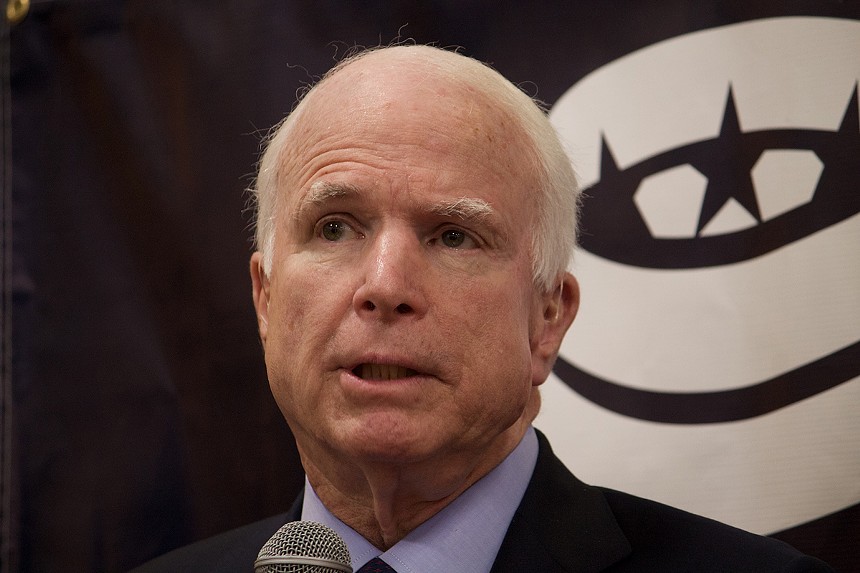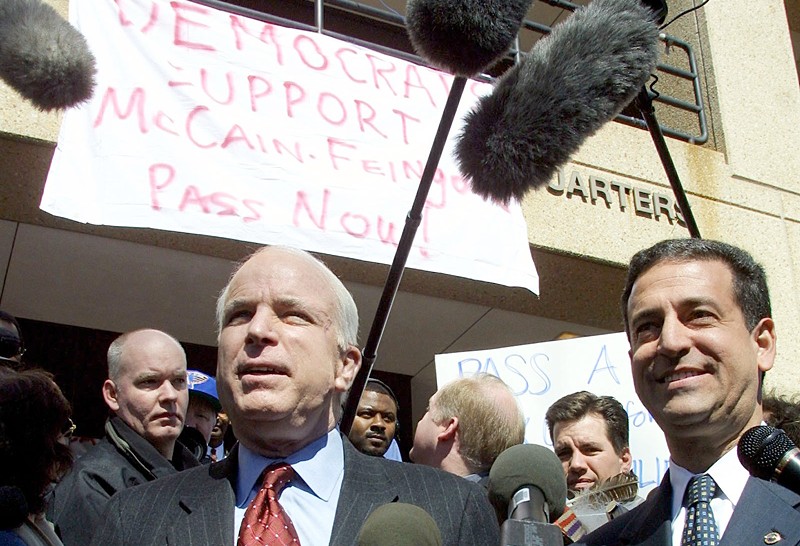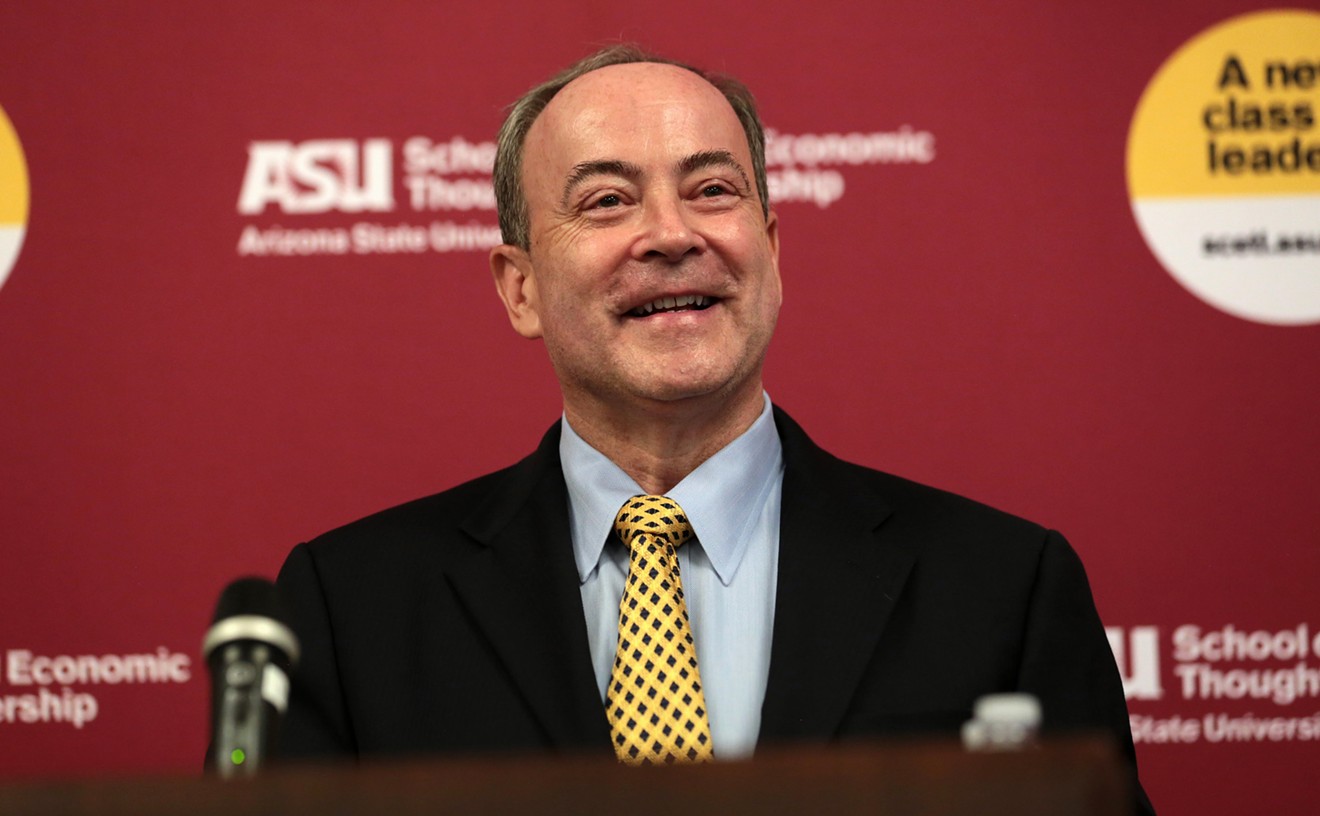It was November 1989, and the Senate Ethics Committee had the freshman U.S. senator from Arizona in its sights. McCain and four other senators — including senior Arizona Sen. Dennis DeConcini — had drawn scrutiny for improperly intervening in a federal investigation on behalf of flamboyant Arizona developer and banker Charles Keating.
Two years earlier, when Keating’s Lincoln Savings & Loan Association was on the verge of being seized by federal regulators, the mogul called in chits from some powerful friends. McCain was one of them.
The two had known each other since 1981 when they bonded over their military backgrounds. Keating had been a Navy pilot during World War II, while McCain was a war hero who’d spent five and a half years as a prisoner in Vietnam. Keating had fundraised for McCain during his 1982 run for the House of Representatives and during his 1986 run for the Senate. Though it wasn’t public at the time, McCain’s father-in-law had invested more than $350,000 in a Keating shopping center in 1986, and Keating had hosted the McCain family at least nine times at his island retreat in the Bahamas.
Now, Keating needed help.
In April 1987, two meetings were held between federal regulators and a group that became known as the Keating Five: McCain, DeConcini and Sens. Alan Cranston (D-CA), John Glenn (D-OH) and Don Riegle (D-MI). A month later, when regulators recommended Lincoln be seized, the chairman of the banking board had been replaced and an audit of the bank was shelved.
Lincoln wouldn’t be seized until April 1989, two years after the Keating Five meetings and just six months before the Senate Ethics Committee investigation into the senators began. That investigation cast McCain as another corrupt politician in an era filled with them — and nearly murdered his political career in the crib. That year, Phoenix New Times called him “clearly the guiltiest, most culpable and reprehensible of the Keating Five.”
Of course, McCain’s career didn’t end, instead lasting until his death in 2018. In between, the Arizona senator recast himself as an anti-corruption crusader, working tirelessly and often unsuccessfully to curb the influence of “special interests” in politics.
Now the Keating Five scandal — and McCain’s subsequent reinvention as a warrior committed to campaign finance reform — is one subject tackled by a popular podcast. “Master Plan” traces the history of modern political corruption, including the movement that birthed the Republican Party’s infamous Project 2025. Episode 6 covers the Keating Five and McCain.
For an hour, host Dave Sirota chronicles how after being burned for his poor decision-making, McCain reoriented his career to take on moneyed interests in politics — and how he lost, won and then lost again.

After the Keating Five scandal bruised his reputation, John McCain made campaign finance reform a central policy goal.
Miriam Wasser
Captain Campaign Finance Reform
In mid-September, the crew behind “Master Plan” gathered in a small office in podcast editor Ron Doyle’s Denver home. Doyle, Sirota and fellow journalist Jared Jacang Maher stared wearily at computer screens. They’d been up late the night before, working to address a newly discovered issue with an upcoming installment.“I’m so utterly fucking over this episode,” said Sirota, the Denver-based journalist who founded “Master Plan” as well as national news outlet The Lever. “Are we making this better? Are we sure?”
The podcast is something between a labor of love and a holy mission. During each episode, Sirota and crew painstakingly lay out the podcast’s central thesis: that the pervasive corruption in politics today was part of a blueprint established 50 years ago.
“Master Plan” is billed as “the untold history from the 1970s to today, showing how a small group of operatives and oligarchs used vast wealth to manipulate key U.S. government policies for personal gain at the expense of everyone else — a plan that’s coming to fruition in the 2024 election.”
The hook is Project 2025, the presidential policy blueprint that’s been splashed across headlines throughout this election cycle. The 900-page policy manual was published in 2023 by conservative think tank The Heritage Foundation, mapping out a hard-right overhaul of the federal government. It’s been demonized by the left, while former President Donald Trump disavowed Project 2025 during his debate with Vice President Kamala Harris.
McCain’s entanglement in the Keating Five scandal isn’t directly related to Project 2025, but it hits on many similar themes. The corrosive influence of money in politics. The reengineering of American government for the benefit of corporations. The systematic silencing of the average voter.
“Okay, put on your flannels and pop Nirvana into your CD player, because we’re moving from the late 1980s and into the 1990s,” Sirota says on the episode. “John McCain, singed by the Keating Five scandal, has become Captain Campaign Finance Reform. His mission? Take back our government from the special interests.”
After McCain emerged from the scandal, his reputation bruised but not ruined, he decided that campaign finance reform would be his pet issue. Through archival audio and interviews with a former McCain aide, “Master Plan” engrossingly retells the story of McCain’s decades-long battle against the rich corporate forces putting their thumbs on America’s political scales.
Elections in the 1990s were flush with corporate cash funneled directly to the political parties, and Democratic President Bill Clinton was accused of “selling the Lincoln Bedroom” in the White House by letting major donors stay the night. When McCain ran for president in 2000, he crisscrossed the country in a bus labeled the “Straight Talk Express” and blasted eventual Republican nominee George W. Bush for cozying up to moneyed interests.
McCain’s biggest quest, which often seemed foolhardy, was to pass a campaign finance reform bill through Congress. For years, McCain and Democratic Sen. Russ Feingold of Wisconsin labored to push a bill into law, only to fall short. It took until 2002 for the McCain-Feingold Act to finally pass, banning soft money contributions to political parties from special interests such as corporations, unions or wealthy individuals — donations that previously had been unlimited.
“I think (McCain) was really the most uncomfortable with the way things were going with Charles Keating,” Maher said. “Then when it all blew up, he was the most contrite. Also, it really changed him fundamentally to go a different direction, and he made campaign finance reform one of his core issues. That really brandished his maverick image to go against what the Republican establishment wanted him to do.”
As Sirota tells it, the McCain-Feingold Act was a valiant effort at taking on the conservative- and corporate-backed scheme to refit American democracy for their purposes. The U.S. Supreme Court even upheld its constitutionality in the wake of a challenge by GOP Sen. Mitch McConnell. But its efficacy soon would be diluted by loopholes.
Independent dark money groups and PACs filled the vacuum left when the political parties were handcuffed by the new campaign finance rules. In 2010, the Supreme Court — now with Bush-appointed John Roberts as chief justice — ruled 5-4 in Citizens United v. Federal Elections Commission that limits on outside political spending violated the First Amendment.
Corporations, the court said, have rights, too.
The history behind Project 2025
The reaction to “Master Plan” has been overwhelmingly positive. Now more than halfway through its first season, the podcast charted second for politics and fourth for news in its first week. Worldwide, it has ranked in the top 20 of all podcasts.“The response to the podcast has been incredible and has far exceeded my expectations,” Sirota said. “I was concerned that because we’re an independent outlet, we’d have trouble breaking through, but there’s so much interest in the topic that the show has gone viral. It tells me that in a media age of homogenized content and cheap mass-produced hot takes, there is a lot of pent-up demand for high-production journalism that takes a lot more time to report and that focuses on taboo topics like corruption that bigger media outlets don’t regularly cover.”
Sirota launched The Lever in 2020 after a stint working as a campaign strategist and speechwriter for Bernie Sanders’s doomed presidential bid. The site's mission “is to hold accountable the people who are making decisions in the shadows,” he said, “and hold power accountable in the hopes that the more people know who’s doing what, what decisions are being made in their name, the more they can help the country make a different set of decisions.”
“Master Plan,” which debuted on Aug. 13, has the same goals. “I think our series illustrates that corruption became intensified and really captured our whole political system through a series of specific decisions by specific people with a specific agenda,” Sirota said.
McCain’s saga is illustrative of those problems, but while “Master Plan” offers a masterful retelling, the podcast has broken newer ground on other episodes. In particular, it won attention for tracing the roots of Project 2025 back to a document written in the early 1970s that spelled out a strategy for defending corporate interests in America.
That memo, authored in 1971 by corporate attorney Lewis J. Powell shortly before he was nominated to the Supreme Court by Richard Nixon, provided a blueprint — a “master plan,” in Sirota’s telling — that was adopted by American oligarchs and the framework for the present political system fueled by business interests, dark money, shrewd policy tacticians and corruption.
The memo was addressed to the U.S. Chamber of Commerce and announced an “ATTACK ON AMERICAN FREE ENTERPRISE SYSTEM.” In it, Powell recommended a multipronged response to perceived attacks from “Leftists” and “Communists”: an aggressive, well-funded campaign for corporate America to rebrand and ingratiate itself with the American public. The plan included the formation of conservative think tanks and policy advocacy institutes, advancing conservative thought on campuses, a media outreach program and a strategy to remake the judiciary, which Powell wrote “may be the most important instrument for social, economic and political change.”
The influence of the Powell Memorandum has been debated in the past; Powell projected a milquetoast centrism as a Supreme Court justice, and the document’s existence wasn’t publicly known until it was discovered by a Washington Post reporter a year after its creation. But a document that had initially warranted maybe one episode of the podcast quickly became its central thesis. There was a master plan to remake American governance according to corporate and conservative interests, and it has effectively been implemented.
“It’s this blueprint for what (Powell) thinks needs to be done for the business elites to take back power,” Sirota said.
“Master Plan” also reveals a series of meetings held by America’s political and business elite in the wake of the Powell memo in which strategy sessions were held to discuss implementation of the blueprint’s recommendations. The memo's spiritual successors can be found in The Heritage Foundation, Arizona-based Turning Point USA and many other conservative organizations that wield influence on American life. Powell himself furthered the cause from the Supreme Court bench in opinions such as First National Bank of Boston v. Bellotti, a precursor to Citizens United.
After the Keating Five embarrassment, McCain battled those forces, crafting an outsized political legacy that still influences Arizona politics. He tallied some victories, successfully turning a wonky issue such as campaign finance reform into a popular demand.
But money still rules politics, with major donors such as Charles Koch and Peter Thiel attempting to play kingmaker. When it came to taking on the rich forces exerting pressure on democracy, even John McCain ultimately lost.













